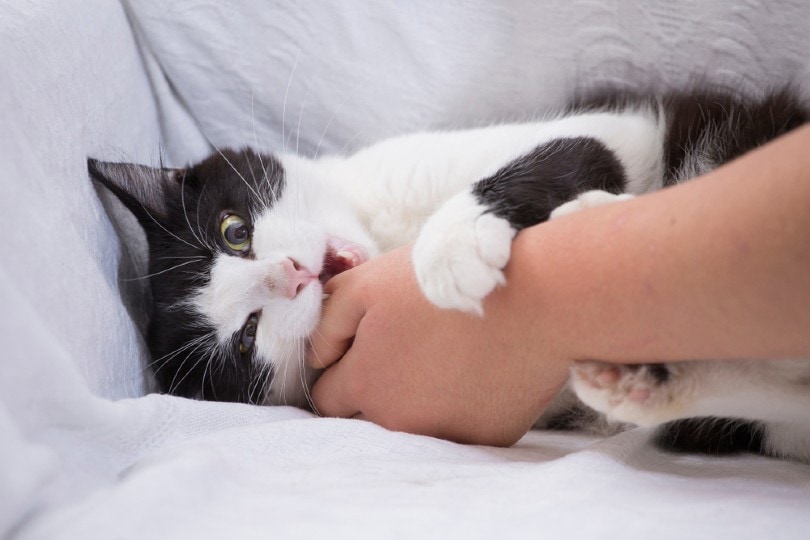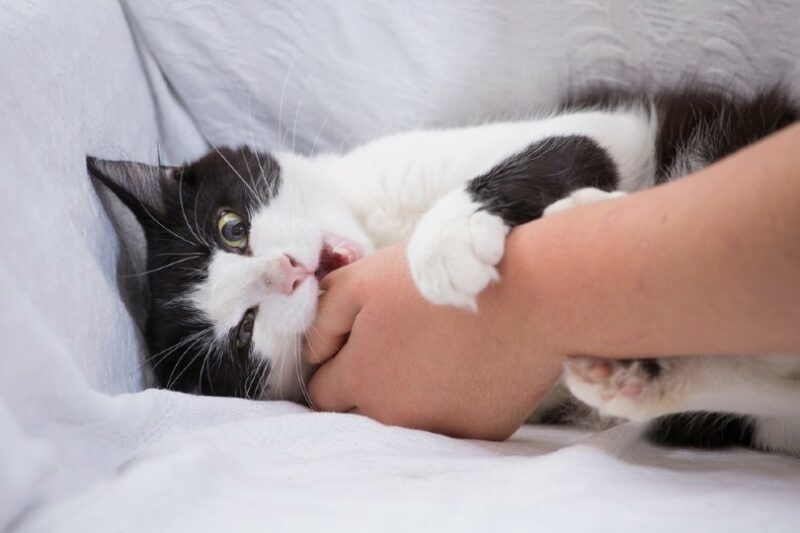Cats aren’t always the most predictable creatures. Sometimes, they adore your petting and practically beg for your attention. Other times, they get irritated and bite you during the petting process. Why is that? More importantly, what can you do to stop the biting?
In this article, we will look at the top three reasons your cat bites you when you pet him and some solutions to help resolve the issue.
The 3 Reasons Your Cat Bites You When You Pet Him (With Solutions)
Here are the top 3 reasons your cat bites you when you pet him:
1. You Touched a Sensitive Spot
Just like humans, cats have certain parts that they don’t usually like to be touched. Cats do not prefer being petted in vulnerable areas, such as the stomach, back, or tail. Even if the spots aren’t necessarily sensitive, cats generally don’t like being pet there. In older or injured cats, some body parts can become sore from scratches, growths, etc.
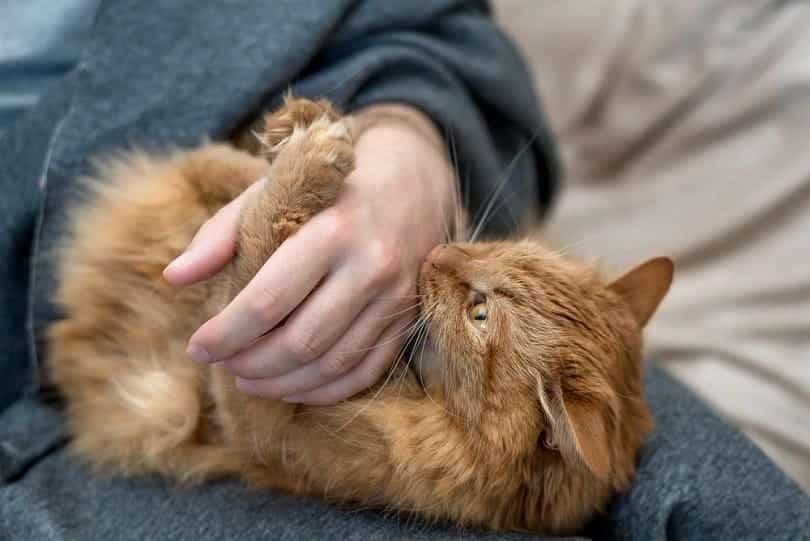
The top way to stop a cat from biting you for this reason is to avoid the sensitive spots entirely. Focus on petting your cat in areas that they like. Cats typically love being petted at the base of their ears, around their cheeks, and under their chin.
If your cat has a sensitive spot, you should take him to the vet. If you feel any growths or sores, get them checked out and treated accordingly. During the process, make sure to be gentle and kind to your cat. He doesn’t like being handled when he is injured.
2. He Is Stressed or Irritated
If your cat is incredibly stressed or irritated by being pet, he might bite you as a sign of aggression. This is likely to happen whenever the cat is afraid of humans or is not used to being touched. Given that cats are so much smaller than humans, it makes sense that they would be scared of us.
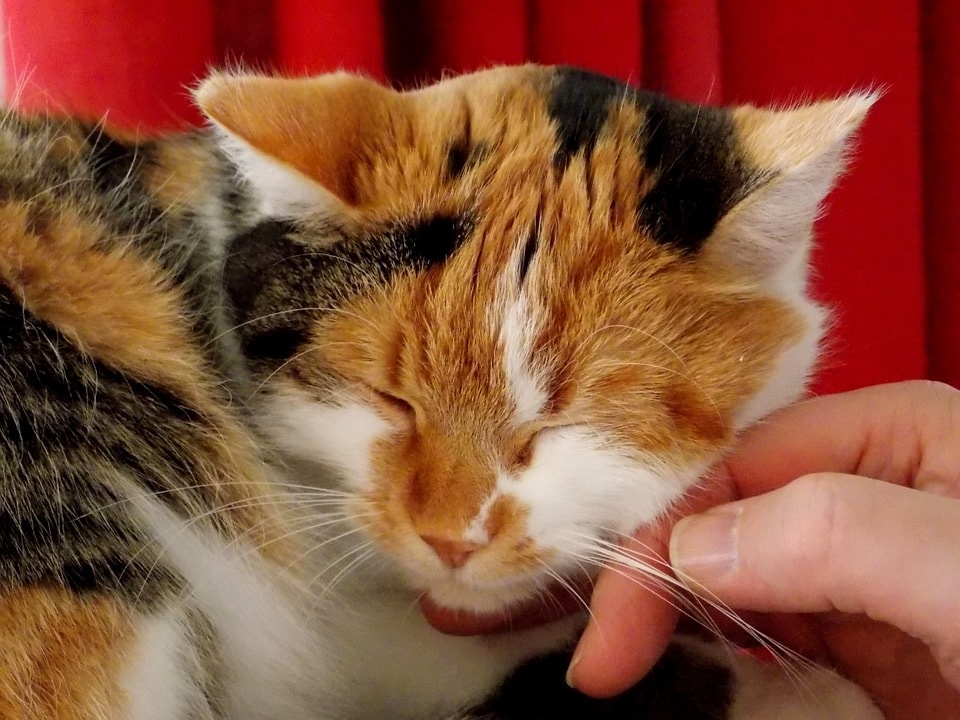
If your cat is biting you because you think he is scared or stressed, the first thing you need to work on is getting him more comfortable around you. Always be kind and encourage your cat to trust you. Like in any relationship, trust takes time to build. Taking care of them, providing healthy food and water, interactive playtime with toys, and the occasional healthy treat are ways to strengthen your relationship with your cat and build trust.
The cat will learn you are a positive factor in their life, but it takes time, so be gentle and patient. If your cat begins to trust you more, you can start acclimating him to being petted. It is recommended that you pet them for short periods. Begin with petting once a day and stay under four strokes, focusing the petting area around the ears and under the chin. Never pet your cat with scratching motions.
You can offer a treat right after you pet him. You should be aware of the signs and notice when your cat starts to get stressed or irritated. Sometimes, your cat may enjoy it, but at other times, he may hate being petted. Look for signs of irritation so that you can stop petting him whenever he feels uncomfortable.
Like you, your cat might not always be in the mood, which is ok! Sometimes, they only like a little bit, and you should not push the limits. It is better to give space and no attention (including no looking at or talking to a moody cat) than too much.
- Flattened ears
- Growling
- Hissing
- Rolling on his back
- Sitting in a hunched position
- Slanted or squinted eyes
- Twitching tail
- Whiskers that are held back
3. It’s a Love Bite
When you hear the phrase “love bite,” you probably think that it is an affectionate response. That is not the case. A love bite is your cat’s way of telling you that they don’t want to be petted anymore. You can think of a love bite as a warning sign before he gets angry. He wouldn’t give you this sign if he didn’t love you!
Love bites typically are not aggressive. Sometimes, love bites are unintentional because they are part of your cat’s grooming habits. So, they rarely break the skin. If you don’t stop petting the cat after their love bite, they will likely aggressively bite you to force you to stop.
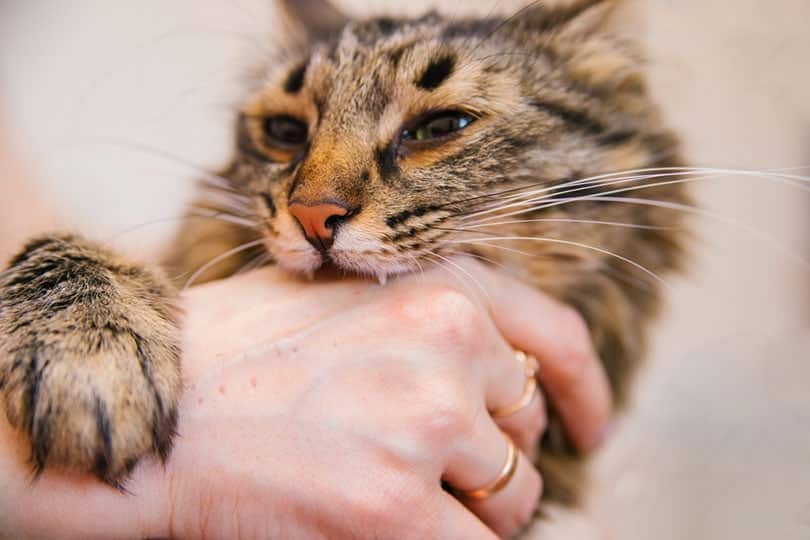
Unfortunately, there is not much you can do to discourage love bites since it is a natural response. You can look for signs of discomfort to know when your cat is beginning to get irritated. For example, if you notice that the cat is twitching his tail or ears, stop petting him.

Don’t Physically Punish Your Cat
Since we are talking about cats that bite, it is essential to note that you should not physically punish your cat after they bite you. Physically punishing your cat includes hitting, kicking, slapping, or throwing the cat about.
You shouldn’t physically punish your cat because it can hurt him. Even a slight push or shove can injure his delicate bones. In addition to hurting your pet, physical punishment will likely make the biting issue worse. As you become physical with him, he will likely become fearful of you, causing him to retaliate more aggressively.

Conclusion
If your cat bites you while you are petting him, it is likely because he doesn’t want to be petted anymore. Even if he adores your attention, cats don’t want to be constantly petted. This is easy to understand since we, as humans, also don’t want to be touched all the time.
To prevent your cat from biting you, look for signs that he is irritated. These signs will tell you that your cat doesn’t want to be pet anymore, allowing you to stop before the situation escalates. If your cat does get to the point where he bites you, never use physical force to teach him a lesson.
Find out more about cat biting behavior:
- Why Does My Cat Bite My Chin? 6 Reasons For This Behavior
- Why My Cat Bites Me When I Sleep and How to Stop It
- 5 Reasons Cats Bite Unprovoked – What You Need to Know!
Featured Image Credit: Luis Echeverri Urrea, Shutterstock

